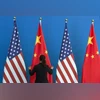The United States is planning to cut the low-value 'de minimis' tariff on China shipments from 120 per cent to 54 per cent, along with a flat fee of $100 to be in place, according to an order from the White House released Monday (local time).
The executive order will come into effect starting May 14. It comes a day after the US and China engaged in trade talks negotiations in Geneva and announced a 90-day pause on the previously imposed tariffs, which escalated tensions between the two countries. Following the trade truce, both the US and China decided to slash the tariff by 115 percentage points. They also slashed the tariffs on goods imported. While the US brought down China's tariffs to 30 per cent from 145 per cent, China reduced the tariffs imposed on US-made goods to 10 per cent from 125 per cent.
Previously, under the de minimis exception, goods valued at up to $800 and sent from China through postal services were able to enter the US duty-free and without minimal inspections.
The de minimis exemption ended in February after US President Donald Trump imposed a tax of 120 per cent of the package's value or an already decided fee of $200, which was set to come into effect in June.
Also Read
A Reuters report suggests that this de minimis exception was being used heavily by Chinese companies like Shein and Temu, and other e-commerce companies, along with traffickers of fentanyl.
What is the de minimis rule?
The de minimis rule dates back to 1938 and allows the entry of goods valued at $800 or less per shipment duty-free. The rule is crucial under Section 321 of the Tariff Act of 1930. By minimizing the formal customs procedures, this rule allows the importation of low-value goods into the US.
Under the de minimis rule, Chinese companies like Shein and Temu were able to offer competitive prices in the US as they did not have to incur any additional tariffs.
With the exemption gone, most products from China now face high tariffs, which threaten the ultra-low-price strategy these companies used to win over the US consumers. In response, both Shein and Temu cut back on advertising in the US and started expanding to other places, like Europe. Amazon even launched a similar service, Amazon Haul, which went live last week in the UK and Saudi Arabia.
How Chinese e-commerce companies operated under tariffs
When tariffs went up, Shein and Temu changed their strategy. Instead of sending each order directly from a Chinese factory to a US customer, they began shipping in bulk and storing items in US warehouses. Temu also announced that, starting May 2, all its US sales are now handled by locally based sellers.
"Temu has been featuring products already in US warehouses," according to a Reuters report, as the company shifts away from its factory-to-door model. Meanwhile, air freight traffic between China and the US has decreased.

)